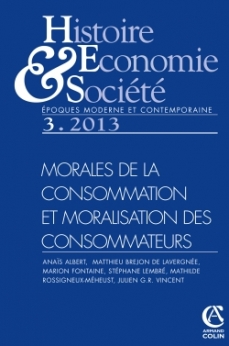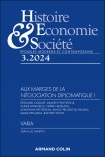
Histoire, économie & société (3/2013)
Pour acheter ce numéro, contactez-nous
Recevez les numéros de l'année en cours et accédez à l'intégralité des articles en ligne.
L’historiographie récente montre que la fin du XIXe siècle est un moment essentiel d’organisation de la consommation engagée en France, sous l’influence des consumers’ leagues américaines. On se propose ici d’affiner la généalogie du « consumérisme politique » en montrant que, dès les années 1850, la question dominicale a suscité des formes similaires d’engagement parmi les catholiques sociaux parisiens. Le paradoxe, bien connu depuis Émile Poulat, est qu’une pensée intransigeante avec le monde moderne conduit à l’« invention » de formes neuves d’intervention dans l’espace social et politique. L’article est par ailleurs attentif à la sociologie des milieux favorables au repos dominical (ni production, ni consommation) et aux logiques de genre qui parcourent leurs associations.
Recent historiography has shown that “ethical consumption” organised itself in France at the end of the nineteenth century on the model of the american consumers’ leagues. My aim is to show that we can observe similar commitments in Paris during the Second Empire. Social catholics fought for Sunday rest (neither production nor consumption on Sundays). Since Émile Poulat, we know how a radical thought wich refuses to compromise itself with the modern world can produce new ways of social and political action. By this way, this article wants to contribute to the history of consumer activism. It dwells on the sociology and gender aspects of the dominical associations.

